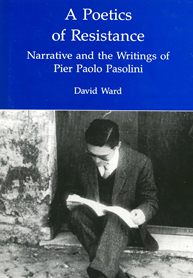
A Poetics of Resistance: Narrative and the Writings of Pier Paolo Pasolini
David Ward
Madison, NJ and London: Fairleigh Dickinson University Press, 1995
A Poetics of Resistance: Narrative and the Writings of Pier Paolo Pasolini examines the writings of the Italian poet, novelist, filmmaker, theorist, and dramaturg.
Since his murder in 1975 - and especially in the last eight years - Pasolini has been the object of growing critical attention, especially in the United States. For the most part, this new attention has been directed at Pasolini's cinema, the part of his multifarious cultural activity for which he is best known outside Italy. Pasolini, however, was extremely active in different areas of Italian cultural life. Before dedicating himself to cinema, he had made his name as a poet, novelist and theorist of language and literature, and in the course of his career also achieved fame as a film theorist, dramaturg, and journalist. This book aims to redress the imbalance by directing critical attention to these relatively neglected areas of Pasolini studies. In particular, the book focuses on the question of narrative form that invests all of Pasolini's writings.
Starting from Pasolini's first encounter with the question of narrative form that in his early Friulan novels, author David Ward then follows the series of experiments that characterize Pasolini's writings through the Roman novels, his language, literature and film theory, journalism, and theater writings up to Petrolio (Oil), his unfinished and posthumously published novel. The book argues that the central concern of Pasolini's writings is the attempt to develop a narrative form that responds to two specific demands: on the one hand, a "possessive," epistemologically rigorous narrative form that enables us to analyze and know the world; and on the other, an open-ended nonpossessive narrative form sensitive to the fragility, integrity, and poeticity of the phenomena of the world and which resists the heavy-handedness of conventional narrative form.
The book offers readers in-depth analyses of all Pasolini's novels, including for the first time in English a detailed analyses of Petrolio, which has received no critical attention outside Italy. The part of Pasolini's writing that has received the most critical attention has been his film theory. As well as offering a panorama of Italian, British, French, and American readings of these difficult essays, ward argues that it is necessary to reconsider the role ascribed to what Pasolini calls "film," the process by which a narrative account of reality is put together.
Ward also offers detailed analyses of Pasolini's six verse tragedies. The book concludes with the suggestion that Pasolini's best attempt at combining the conflict demands that the notions of "film" and "cinema" produced in his film writings comes with his "Manifesto for a New Theater," which has previously been neglected by scholars."
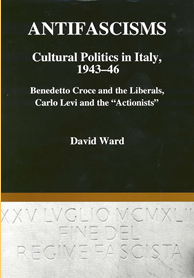 Antifascisms: Cultural Politics in Italy, 1943-46: Benedetto Croce and the Liberals, Carlo Levi and the "Actionists"
Antifascisms: Cultural Politics in Italy, 1943-46: Benedetto Croce and the Liberals, Carlo Levi and the "Actionists"
David Ward
Madison, NJ and London: Fairleigh Dickinson University Press, 1996
"This book is an in-depth analysis of three of the most crucial years in twentieth-century Italian history, the years 1943-46. after more then two decades of a fascist regime and a disastrous war experience during which Italy changed sides, these years saw the laying of the political and cultural foundations for what has since become known as Italy's First Republic. Drawing on texts from the literature, film journalism, and political debate of the period, Antifascisms offers a thorough survey of the personalities and positions that informed the decisions taken in this crucial phase of modern Italian history.
Arguing against the overly simplistic view of the Italian resistance to Fascism that has at time emerged from historiography, literature and films of the immediate postwar years, this book focuses on the tensions that riddled and ultimately undermined the unity of intent of Italy's anti-Fascist political parties - grouped together in the alliance known as the Committee for National Liberation. Within the alliance, two main, and contrasting, groups are identified: a first, more moderate group on anti-Fascists, composed mainly, but not exclusively, of Italian liberals, for whom pre-Fascist Italy provided a workable model on which two base post-Fascist society; and a second, more radical, group, formed mainly around the Partito d'azione (Action Party), whose picture of postwar Italian society owed nothing and bore little resemblance to pre-Fascist Italy. For the former, pre-fascist Italy was the answer to Italy's postwar problems; for the latter, pre-Fascist Italy itself was the problem, its democratic limits providing the kind of fertile terrain on which, they feared, Fascism in another form could grow.
These contrasting pictures of what postwar Italy should look like, the author argues, are themselves contingent on a prior analysis of Fascism. If for moderate anti-Fascists, Fascism had been nothing other than a virulent parethesis in the course of Italian and European history, for the more radical anti-Fascists, Fascism, which they saw as the logical result of the deeply flawed historical cycle that had brought Italy from the Risorgimento to the present, was anything but an aberration. Far from being a phenomenon extraneous to Italian history, Fascism was Italian history, Italy's autobiography, the revelation of what had always lain beneath the nation's surface.
Antifascisms examines how these mutually exclusive standpoints impacted on the political reality of the 1943-46 period and on the crucial decisions that marked those years: the drafting of the Constitution, the founding of the Republic, and the amnesty that reprieved Fascist collaborators."
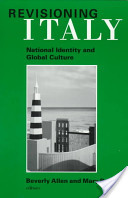 Revisioning Italy: National Identity and Global Culture
Revisioning Italy: National Identity and Global Culture
https://www.upress.umn.edu/book-division/books/revisioning-italy
Edited by Beverly Allen & Mary Russo Minnesota, University of Minnesota Press, 1997
See Chapter 5, “’Italy’ in Italy: Old Metaphors and New Racisms in the 1990s” by David Ward, pp. 81-100
The volume bears on a range of subjects drawn from Italy and abroad in order to study the historical and contemporary formations of Italian national identity. In doing so, the work illuminates Italy past and present as well as the local and global dimensions of national identity in general.
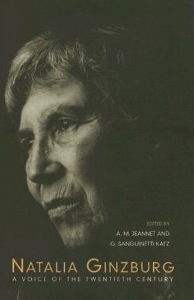 Natalia Ginzburg: A Voice of the Twentieth Century
Natalia Ginzburg: A Voice of the Twentieth Century
Edited by Angela M. Jeannet & Giuliana Sanguinetti Katz
Toronto: University of Toronto Press, 2000
See Chapter 2, “Natalia Ginzburg’s Early Writings in L'Italia libera” by David Ward, pp. 46-62 & “Three Articles by Natalia Ginzburg,” trans. David Ward, pp. 226-241
A prominent and prolific Italian writer, Natalia Ginzburg (1916-1991) is known for her novels, plays, short stories, and essays. This collection brings together, for an English-speaking audience, a variety of critical perspectives on Ginzburg's work.
The essays, all by North American scholars, examine the author's entire production. The topics examined include Ginzburg's struggle to define herself as a woman, a writer, and an intellectual; her interpretation of the relationship between historical events and private lives; her reflections on the women's movement and the changing nature of the family; and her mastery of a distinctly personal writing style. What emerges here is a nuanced and complex portrait of Ginzburg and her work. The reader is given a sense of the importance of her contribution, not only as a writer but as a witness to the events of the twentieth century. The volume also includes a chronology, a bibliography, and translations of some of Ginzburg's lesser-known writings, including three articles, a poem, and a one-act play.
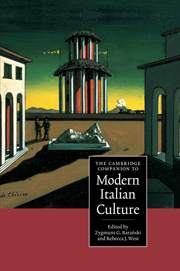 The Cambridge Companion To Modern Italian Culture
The Cambridge Companion To Modern Italian Culture
Edited by Zygmunt G. Baranski & Rebecca J. West
Cambridge: Cambridge University Press, 2001
See Chapter 4, "Intellectuals, Culture and Power in Modern Italy" by David Ward (pp. 81-96)
"This book provides a comprehensive account of the Culture of Modern Italy. Specially commissioned essays by leading specialists focus on a wide range of political, historical and culutral questions. The volume provides information and analysis on such topics as regionalism, the growth of a national language, social and political cultures, the role of intellectuals, the church, the left, Feminism, the separatist movements, organized crime, literature, art, design, fashion, the mass media and music. While offering a thorough history of Italian cultural movements, political trendsand literary texts over the last century and a half, the volume also examines the cultural and political situation in Italy todayand suggests possible future directions in which the country might move. Each essay contains suggestions for further reading on the topics covered. The Cambridge Companion To Modern Italian Culture is an invaluable source of materials for courses on all aspects of modern Italy."
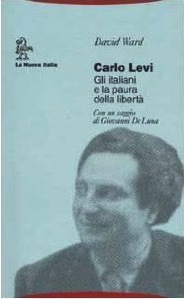 Carlo Levi: Gli italiani e la paura della libertá
Carlo Levi: Gli italiani e la paura della libertá
David Ward
Milan: Rizzoli/Nuova Italia, 2002
"Intellettuale eclettico, scrittore, pittore, storico, militante politico. Carlo Levi attraversa tutte le dimensioni dell'impegno culturale mantenendo saldamente intatto un nucleo concettuale e teorico, di cui il libro di Ward ci restituisce le coordinate essenziali: il ruolo cruciale delle autonomie e del federalismo per spezzare la cappa di passivita' del centralismo statale; la paura della libertá come abito mentale degli italiani sedotti dal fascismo e dal mito politico e del leader carismatico; le speranze riposte nella potenzialita' creative dei mondi "altri" rispetto allo sviluppo industriale, il sud contadino e tutti gli ultimi della terra; il confronto serrato con la morte come tratto distintivo di una concezione della vita profondamente laica."
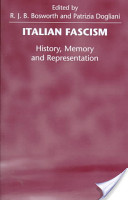 Italian Fascism. History, Memory and Representation
Italian Fascism. History, Memory and Representation
https://www.palgrave.com/us/book/9780312217174
Edited by R.S.J. Bosworth & Patrizia Dogliani.
Basingstoke, GB and London, MacmIllan Press, 1999.
See Chapter 4, "From Croce to Vico: Carlo Levi's L'Orologio and Italian Antifascism, 1943-46," by David Ward, pp. 64-82
Bringing together scholars from the Italian and English-speaking worlds, this book reviews the history of the memory and representation of Fascism after 1945. Ranging in their study from patriotic monuments to sado-masochistic films, the essays ask how, why and when Mussolini's dictatorship mattered after the event and so provide a fascinating study of the relationship between a traumatic past and the changing present and future.
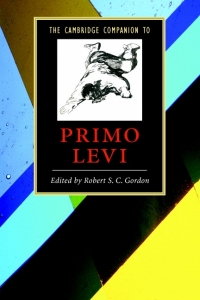 The Cambridge Companion to Primo Levi
The Cambridge Companion to Primo Levi
https://www.cambridge.org/core/books/the-cambridge-companion-to-primo-le...
Edited by Robert S. C. Gordon
Cambridge: Cambridge University Press, 2007
See Chapter One, "Primo Levi's Turin," by David Ward (pp. 1-16)
Primo Levi (1919–1987) was the author of a rich body of work, including memoirs and reflections on Auschwitz, poetry, science fiction, historical fiction and essays. In particular, his lucid and direct accounts of his time at Auschwitz, begun immediately after liberation in 1945 and sustained until weeks before his suicide in 1987, has made him one of the most admired of all Holocaust writer-survivors and one of the best guides we have for the interrogation of that horrific event. But there is also more to Levi than the voice of the witness. He has increasingly come to be recognized as one of the major literary voices of the twentieth century. This Companion brings together leading specialists on Levi and scholars in the fields of Holocaust studies, Italian literature and language, and literature and science, to offer a stimulating introduction to all aspects of the work of this extraordinary writer.
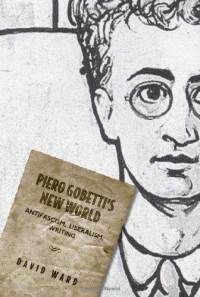 Piero Gobetti's New World: Antifascism, Liberalism, Writing
Piero Gobetti's New World: Antifascism, Liberalism, Writing
David Ward
Toronto, University of Toronto Press, 2010
Piero Gobetti (1901-1926) was one of twentieth-century Italy's most innovative political thinkers. A noted intellectual, radical liberal, and antifascist, in his short life he founded two cultural reviews that attracted the attention of many Italian intellectuals of the time, including Benedetto Croce and Giovanni Gentile. However, Gobetti and his editorial activities also quickly drew the attention of the fascist regime, resulting in the banning of his publications, and in his persecution, physical beating, and premature death in exile.
Piero Gobetti's New World is an introduction to Gobetti's thought on the intellectual's role in Italian cultural renewal. It is also an in-depth study of the three main questions on which his writings focus: the relationship between Italian history and fascism, the nature of a genuine antifascist political culture, and the crisis of Italian liberalism in his day. While providing important historical and cultural context, David Ward follows Gobetti's attempts to carve out an oppositional role for the liberal intellectual during the fascist regime. Ward suggests that the eighteenth-century Piedmont patriot Vittorio Alfieri was Gobetti's greatest source of inspiration, especially in regard to his own writing practice. Gobetti, Ward argues, played a pivotal role in Italian intellectual life of the time. He was above all a persuader and propagator of ideas, a militant antifascist intellectual who sought to form and reform hearts and minds, and to this end his writing was his most effective resource.
Contemporary Italian Narrative and Terrrorism of the 1970s: Stranger than Fact
https://www.springer.com/gb/book/9783319466477
David Ward
London & New York, Palgrave-MacMillan, 2017
This book is about literary representations of the both left- and right-wing Italian terrorism of the 1970s by contemporary Italian authors. In offering detailed analyses of the many contemporary novels that have terrorism in either their foreground or background, it offers a “take” on postmodern narrative practices that is alternative to and more positive than the highly critical assessment of Italian postmodernism that has characterized some sectors of current Italian literary criticism. It explores how contemporary Italian writers have developed narrative strategies that enable them to represent the fraught experience of Italian terrorism in the 1970s. In its conclusions, the book suggests that to meet the challenge of representation posed by terrorism fiction rather than fact is the writer’s best friend and most effective tool. It represents the first comprehensive account of the engagement with 1970s terrorism in contemporary Italian literature.

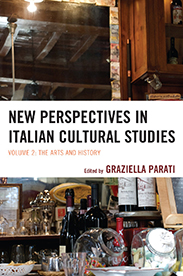 See “Massimo D’Azeglio’s Ettore Fieramosca: The Necessity & the Joy of Fiction,” by David Ward, pp. 3-16
See “Massimo D’Azeglio’s Ettore Fieramosca: The Necessity & the Joy of Fiction,” by David Ward, pp. 3-16